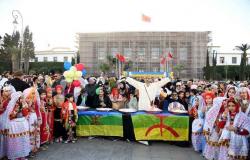The Secretary of State for Maritime Fisheries, Zakia Driouich, a reassured fishermen about the orca attacks recently observed. Explained by protection against danger, these attacks are not aggressive or hostile, affirmed the government official while highlighting the efforts made by the Kingdom to support the blue economy.
In a context where fisheries wealth is deteriorating in Morocco, the government is striving to react in order to preserve what can still be preserved. Recently, attacks of ochres have been observed, a situation which raises several concerns. In response to a parliamentary question, Zakia Driouich, the Secretary of State for Maritime Fisheries, outlined the efforts made to counter orca attacks, in particular against fishing boats.
She stressed that these incidents remain relatively rare and in no way constitute aggressive or violent behavior.
In her response, the manager detailed that the National Fisheries Research Institute (INRH) is intensifying its research and scientific monitoring in order to better understand the motivations of orcas and identify the measures to adopt to minimize negative interactions between these cetaceans. and fishing boats.
She specified that the institute is putting in place initiatives to collect data through monitoring and exchanges with fishermen, with the aim of better understanding the behavior of orcas, in particular by analyzing the causes of their attacks against boats and their movement patterns.
Thanks to this information, added Zakia Driouch, the institute was able to monitor orca gatherings and develop maps of risk areas, which are currently being adopted by the competent Moroccan authorities.
The Secretary of State also mentioned the expansion of exploration campaigns in Spanish waters to include Moroccan areas north of Larache, within the framework of a scientific and technical partnership with the Spanish Institute of Oceans. This partnership aims to better understand the distribution of orcas south of the Strait of Gibraltar.
-In an effort to track these incidents and protect fishermen from potential orca attacks, modern technologies, such as smartphones integrated into the fisheries watchdog program, are being used to monitor these events, Driouich added.
It also highlighted Morocco’s involvement in several specialized international organizations, thus facilitating the coordination of research efforts and the exchange of expertise. For example: the meeting held in Madrid at the beginning of 2024, under the aegis of the International Whaling Commission (IWC), in which specialized researchers as well as representatives of the competent authorities of Spain participated, from Portugal and Morocco.
According to Zakia Driouich, this meeting made it possible to reach a scientific consensus based on available data and the results of research carried out on the subject. It was concluded that interactions between orcas and fishing boats are not considered hostile or violent.
The hypotheses most frequently put forward to explain these behaviors include curiosity or the feeling of threat towards the concentration zone of the orcas or their conspecifics, as well as the stress generated by human activities, which could encourage the orcas to attack boats. However, these attacks remain relatively limited, said the Secretary of State.
Thus, she insisted on the continuation of studies to better understand the causes of these behaviors, stressing that assessments are underway concerning the impact of human activities such as fishing and pollution. The objective is to provide scientific recommendations allowing the development of policies aimed at reducing this impact, which is likely to cause these attacks.






